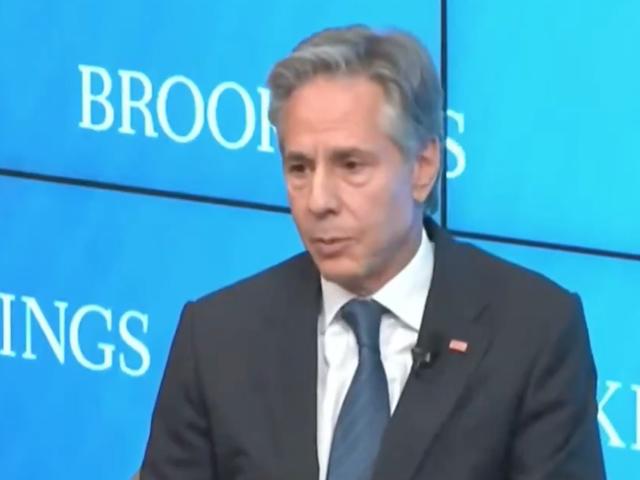In a dramatic revelation at the Brookings Institute, U.S. Secretary of State Antony Blinken declared that Israel has "lost sovereignty" in regions along its border due to relentless assaults by the Lebanese terror group Hezbollah. Blinken's remarks underscore the grave and escalating security situation facing Israel, a nation under constant threat from its northern neighbor.
Since October, Hezbollah has intensified its attacks on Israel, culminating in a significant uptick in aggression over the past month. This surge in violence has stoked widespread fears that a full-scale war might be imminent. As of Tuesday, Hezbollah had not launched any new attacks, although the previous evening witnessed a barrage of assaults after a day of relative calm.
Israeli forces have yet to respond with counterattacks, though reports from Lebanon indicate a man was killed in an Israeli strike in al-Bustan on Monday afternoon. The tension has reached a boiling point, with Blinken confirming a growing "momentum" towards a broader conflict between Hezbollah and the Israel Defense Forces (IDF). However, he emphasized that none of the involved parties desire such an outcome.
ICYMI: Yesterday, we were honored to host @SecBlinken for a a wide ranging conversation with @MaloneySuzanne on the state of U.S. foreign policy.
— Brookings Foreign Policy (@BrookingsFP) July 2, 2024
Watch the full conversation here: https://t.co/5KUIMwqzOY pic.twitter.com/AL7fTSRGfg
"None of the main actors actually want a war," Blinken stated. "Israel doesn’t want a war, although they may well be prepared to engage in one, if necessary. I don’t believe Hezbollah actually wants a war. Lebanon certainly doesn’t want a war, as it would be the leading victim. And I don’t believe Iran wants a war either, as it seeks to preserve Hezbollah as a strategic asset."
Despite intense mediation efforts by the U.S., France, and other European nations, diplomatic solutions remain elusive. Hezbollah continues to demand a complete cessation of Israel’s operations against Hamas in Gaza as a precondition for halting its attacks.
The U.S. has been deeply involved in these diplomatic efforts, with Blinken noting that a preferable outcome would be a negotiated agreement for Hezbollah to vacate the border area. The plight of tens of thousands of Israelis displaced by the conflict was also highlighted, with many unable to return home due to safety concerns. "Absent doing something about the insecurity, people won’t have the confidence to return," Blinken warned.
The Amphibious Command Ship, USS Mount Whitney (LCC-20) has entered the Mediterranean Sea where she will likely link with the USS Wasp (LHD-1) Amphibious Ready Group in the Eastern Mediterranean, in order to assist with Military Evacuation Operations if they need to be conducted… https://t.co/VyuVqp1HJZ
— OSINTdefender (@sentdefender) June 30, 2024
Adding to the tension, the German newspaper Bild reported that Israel is planning a ground incursion into southern Lebanon in the latter half of July, should Hezbollah’s aggression continue. "It will start in the third or fourth week of the month," the report stated.
Germany, among other nations, has urged its citizens to leave Lebanon due to the escalating situation. Lufthansa, Germany's primary airline, announced a suspension of nighttime flights to and from Lebanon until the end of July as a precautionary measure.
In a bid to stave off a wider conflict, Ole Diehl, the deputy director of Germany’s Federal Intelligence Service (BND), traveled to Lebanon for talks with Hezbollah’s second-in-command Sheikh Naim Qassem. According to sources, the discussions were "positive" and focused on preventing an all-out war. This meeting followed a recent visit by Germany’s Foreign Minister Annalena Baerbock to Beirut and Jerusalem.
Blinken: Israel has lost sovereignty in north due to Hezbollah https://t.co/VaTiYqWKyu #YaLibnan #Lebanon
— EyeonLebanon (@EyeonLebanon) July 2, 2024
Despite these diplomatic overtures, Hezbollah's stance remains unchanged. Qassem reiterated that the group would only cease its attacks once the conflict in Gaza is fully halted, maintaining a firm and unyielding position.
As the world watches, the situation on Israel's northern border remains perilous, with the potential for a devastating conflict hanging in the balance. The international community's efforts to mediate and de-escalate the situation are critical, yet the path to peace appears fraught with challenges and uncertainty.


